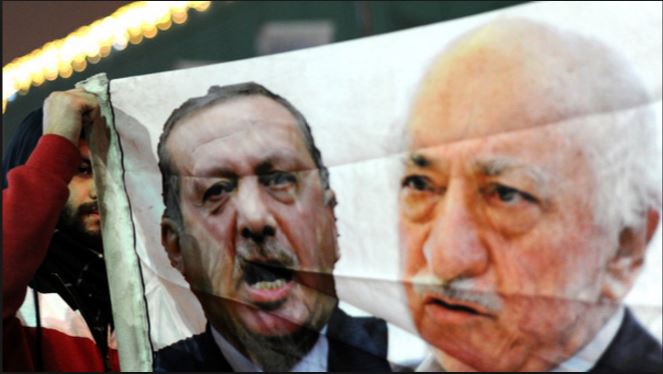Leak deepens AKP-Gulen rift

Date posted: December 3, 2013
Tulin Daloglu
The rift between Turkish Prime Minister Recep Tayyip Erdogan and the prestigious Fethullah Gulen religious movement hit the surface last week. On Nov. 28, Mehmet Baransu of Taraf published a copy of a National Security Council (NSC) advisory ruling under the headline: “Measures needed to be taken to counter activities by the Fethullah Gulen group.”
In January 2010, Baransu broke news that played a pivotal role in ending the military’s tutelage over civilian politics, which terminated in a long, complicated trial process, sending hundreds of retired and current military personnel behind bars for an attempted coup in 2002-2003 that never took place. A week before Baransu published his 2010 article, an unnamed source delivered him a suitcase containing 5,000 pages of scanned documents, CDs of slides and 48 hours of audio recordings, which established the basis for the prosecutor’s case. The accused military personnel contested the authenticity of all the digital evidence in the court case — commonly known as the Ergenekon trials — to no avail.
Baransu now says he has received yet another suitcase full of documents, and that he would be carefully going through them, implying that there may be new top-level classified material to be revealed in the coming days. The NSC document, he says, appeared as an obvious news bite at first sight. This is what he reported:
“At the National Security Council’s meeting in August 2004, the government was informed of the advisory decision ‘to draw up a plan of action against the movement’ under the headline: ‘Measures needed to be taken to counter activities by the Fethullah Gulen Group.’
“The NSC ruling reads: ‘Legislation that introduces heavy sanctions needs to be passed and an action plan needs to be drawn up’ in order to block ‘Nurist [Nurcular Muslim movement] activities and the activities of institutions belonging to the Fethullah Gulen group.’
“The NSC ruling, dated Aug. 25, 2004, was signed by then-President of the Republic Ahmet Necdet Sezer, Prime Minister Recep Tayyip Erdogan, Chief of the General Staff Hilmi Ozkok and Foreign Minister Abdullah Gul as well as five ministers of the Cabinet. The [military] members of the NSC, Aytac Yalman, Ozden Ornek, Ibrahim Firtina and M. Sener Eruygur also signed the same document. (The four were all convicted in the Ergenekon trial and sentenced to long prison terms.)
“The topic of ‘Nurist activities in Turkey and Fethullah Gulen’ was addressed at the NSC meeting on June 24, 2004. The meeting made 15 separate decisions relating to ending the Gulen groups’ activities. The ruling was turned into a two-page document, given a heading and passed on to the relevant people.
“In the ruling, which is on record as NSC decision No. 481, it underscores that a decision was made ‘to come up with a plan of action’ while listing each and every step to be taken by official institutions. It is also stressed that attention needs to be paid to the ‘psychological operations aspect’ of the topic. As for the measures to be applied to the Gulen community, the Interior Ministry, Foreign Ministry and MIT [National Intelligence Organization] were tasked with this under the coordination of the Prime Ministry Enforcement and Coordination Board (BUTKK).
“Here are some of the headlines in the NSC advisory ruling: ‘The activities of both foreign and domestic wings of the F. Gulen group should be monitored closely by the Interior Ministry, the Foreign Ministry, the MIT and other pertinent agencies under the coordination of the BUTKK. If the F. Gulen group needs to be closely followed by the state’s officials serving abroad, additional measures will need to be developed by the Foreign Ministry. The activities of private schools belonging to the F. Gulen group need to be examined and kept track of by the Interior Ministry and the Education Ministry. Suspicious and illegal activities going on in schools belonging to this group should be reported periodically to the BUTKK.
“The NSC ruling reads: ‘Legislation introducing heavy sanctions needs to be passed.’ The ruling also places emphasis on ‘student hostels.’ The NSC ruling emphasized the need to make legislation effective and says: ‘The activities of the F. Gulen group to gain sympathizers and supporters by means of its ‘student hostels’ should be carefully monitored by the Interior Ministry. The practice of ‘student hostels’ which provide religious education using illegal means, and which is a system for enlisting supporters by making religion a kind of tool, should be obstructed.”
While there is still more in the article, Baransu concludes by asking the following question: “Given the NSC ruling, who can assert with confidence that MIT has not been running an operation (against the F. Gulen group) since then?”
There may be no easy answer to this question. Many in the media, for example, wonder why the government signed such a document as Ozkok was considered a democratic personality with close ties to Erdogan. It defies logic that he had threatened the prime minister with military power. After all, everyone on the above list from the military side is behind bars except Ozkok. The media here also are putting the timing of the new suitcase delivery to this journalist under a skeptical spotlight, wondering and speculating about who might be behind this new round of leaks, and the potential goal behind the release of the information.
The Erdogan government recently took a bold step to close the private tutoring halls preparing students for university exams; the halls serve as a significant income source of the Fethullah Gulen movement. Erdogan also recently brought into the spotlight that male and female students have been sharing rental homes; many in the Ankara beltway at first linked this action to the Gezi Park protests where the protesters were mostly of university age, and that they might have done protest organizing in the homes. There is now beltway speculation that the NSC 2004 advisory ruling touched on those student homes, and that Erdogan might have brought the issue not only for its moral aspect, but to target something else.
There is, however, another issue that is being tensely debated in the media — whether the leaking of this NSC top-secret classified document is a sign of state weakness.
On that note, one can look at how the United States handled Wikileaks, where many highly classified communications of the State Department were published. It was not an easy time for many diplomats, as their work requires secrecy to protect their country’s best interests. Still, if the US has lost its credibility around the world, it is not for the leakage of these secret communications, but its controversial policies. It should be no different here in Turkey, as well.
Therefore, there needs to be a principled approach to these leaks. If it was for the public good that Baransu’s reporting in 2010 brought the end of military’s tutelage in Turkey, the new suitcase delivery to this journalist should be treated the same — and be perceived as an attempt to strengthen the country’s democracy. That said, there is a difference in perception about the approach to something, and the perception about its conclusion.
To be specific, if preparation of a military coup is treated as a criminal act, it’s legally mind-boggling to send people behind bars for numerous years for a crime they thought about but did not carry out. In the NSC document, there certainly is nothing constituting crime, but it’s a direct blow to the Erdogan government. The reason is simple.
When certain leaks like these happen, people are interested in them because they demand that their government and the state be transparent. The people demand to be told the truth. They now see that the Erdogan government wears a different face behind closed doors, and that the Islamic camp is literally fighting for power — not for upholding the highest moral standards serving the people in the name of God. That perception — at a time when Turkey enters election season, from local to presidential to general, only highlights that Erdogan is not as confident as he claims.
The path ahead is unprecedented, but one can only hope that this house infighting in the Islamic camp helps the country to be aware of the facts of the country’s governance. Omer Dincer, former minister of education, in response to the complaints coming from the Fethullah Gulen movement, said, “We did not implement that ruling. We allowed them all the freedom they asked for, and they are more powerful today in Turkey than they were a decade ago.” That may very well be the reason behind today’s problem. The government helped the Fethullah Gulen movement get stronger by violating the simple rule of equal opportunity for all citizens; it was the government that helped this movement gain power by grouping it in state institutions like the security and judiciary establishment.
![“The NSC ruling reads: ‘Legislation that introduces heavy sanctions needs to be passed and an action plan needs to be drawn up’ in order to block ‘Nurist [Nurcular Muslim movement] activities and the activities of institutions belonging to the Fethullah Gulen group.’](http://hizmetnews.com/sds/wp-content/uploads/2013/11/2004-NSC-Gulen-purge-decision-754x1024.jpg)
“The NSC ruling reads: ‘Legislation that introduces heavy sanctions needs to be passed and an action plan needs to be drawn up’ in order to block ‘Nurist [Nurcular Muslim movement] activities and the activities of institutions belonging to the Fethullah Gulen group.’
Source: Al-Monitor , December 2, 2013
Tags: Defamation of Hizmet | Hizmet (Gulen) movement | Hizmet and politics |
























